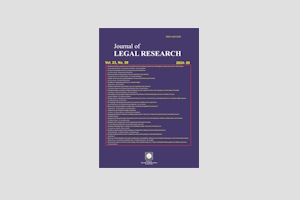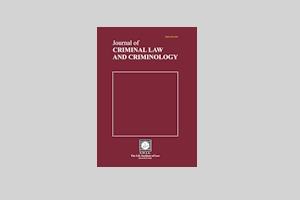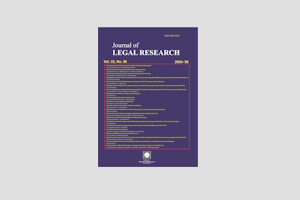Journal of
Criminal Law and Criminology
Number 11
Vol. VI ● No. 1
Spring – Summer 2018
Managing Editor: Vahid Eshtiagh
Editor-in-Chief: Mohammad Ashoori
CONTENTS
Articles
Reflections on the Criminalization of Use of Chemical Weapons and ICC’s Jurisdiction Ratione Temporis on this Crime in the light of the Iraq – Iran War
Dr. Mahdi Abdulmaleki & Dr. Seyed Ghasem Zamani
Criminological Invesitgation of Violence by Football Fans
Majid Aghaee & Dr. Ali saffari
Assessing the Effectiveness of Psychodrama on Decreasing Aggression of Children (Using Psychodrama instead of Classical Methods of Punishing Violent Behaviors)
Dr. Mohammad Ashouri & Elmira Soleimany Savad Roudbary
Interim Order in Criminal Matters
Dr. Mansour Rahmdel
Iran’s Judicial Criminal Policy on Alternatives to Imprisonment
Davood Khaksar & Dr. Hossein Gholami
The Study of Marginalization’s Impact of Crime (Marginalization Districts of Dowlat Abad in the Kermanshah)
Dr. Tahmoores Bashirie & Mohammad Saeed Mozafari
Using Cultural Criminology in Analysis Minor and Juvenile Delinquency by Relay on Carnival, Adrenalin and Second Life Concepts
Dr. Sara Aghaei
Articles
Reflections on the Criminalization of Use of Chemical Weapons and ICC’s Jurisdiction Ratione Temporis on this Crime in the light of the Iraq – Iran War
Dr. Mahdi Abdulmaleki
Law Department, Najaf Abad Branch, Islamic Azad University, Najaf Abad, Iran
&
Dr. Seyed Ghasem Zamani
Associate Professor of Law and Political Science Faculty,
Allameh Tabataba’i University, Tehran, Iran
Abstract:
Today, the rule of law is one of the most significant subjects in international law. The rule of law for the organizations such as international criminal court both possesses internal dimension, namely they must be under an obligation to respect their constitutive statute and other rules of international law and external dimension, namely their impact on the other institutions such as states, international organizations and human beings to respect international law. Based on the internal dimension of the rule of law this essay considers ICC’s jurisdiction on employing chemical weapons in international and non-international conflicts, due regard to Iraq war against Iran.
Although, ICC has the jurisdiction to prosecute employment of poisoned weapons and asphyxiating gases, there are some opinions on the non-criminalizing to employ chemical weapons in the statute in which it makes haste analogy in the criminal law. Additionally, there is an opinion that ICC can exercise its jurisdiction on some conducts which were crimes before the entry into force of the Statute and now those crimes have also been criminalized in the Statute. Nonetheless, it can be said for realization of this issue, ICC faces with some obstacles such as Jurisdiction Ratione Temporis, non-membership of Iran and Iraq in the Statute, obligation to observe Statute’s regulations, for example article 10 and the rule of non-retroactivity Ratione Personae and these are principles in which ICC is obliged to apply in direction of the rule of law.
Keywords: International Criminal Court, Chemical Weapon, War Crime, Jurisdiction Ratione Temporis.
Criminological Invesitgation of Violence by Football Fans
Majid Aghaee
Ph.D. Student of Criminal Law and Criminology, Faculty of Eslamshahr University, Iran
&
Dr. Ali saffari
Assistant Professor of Department of Criminal Law and Criminology,
Faculty of Law Shahid Beheshti University, Tehran, Iran
Abstract:
Criminology intends, identify the causes of genesis of violence, as one of the care issues itself, to control the damage caused by violence in the light of this study the question is about the violence of soccer fans and the factors influencing it on the basis of research questions Criminology of violence, by football fans, it has many criminology dimensions.
1. Violence of football fans is more legally defined in terms of crimes against property and verbal violence;
2. The role of sociological and environmental factors, such as economic factors and situations.is more pronounced in the area of violent altitude of fanatics, as assumptions of research. Different theories in the area of life and society and cognitive society are presented in this regard. In Iran, the type and guilty of this, violence is not, comparable to that of the countries, of the world. However, it is not denied and as a deviate is some cases it takes a criminal color. The present study was conducted on one the methodology of the library and the media combined and integrated among 386 spectators and supports of Esteghlal and Perspolis teams.
The findings show that the reasons for violence between, spectators go back to sociological and psychological, issues.
Issues such as age, income, leisure time, adaptation of the goals and control and supervision of transportation vehicles and facilities of the stadium along with the views of Clarck and Robert Merton and the special features of the Iranian community can be combined as well as in dependent in the criminology of violence among football fans in Iran. The level of family control, the economic and social base has a significant negative effect and the history of fights, strife, failure and smoking and the criminal record between friends and relatives and criminal record and collective and group depart true, has a positive and significant impact on the violence of the football spectators of the Esteghlal and Perspolis teams of violence.
Keywords: Criminology, Violence, Football Fans, Vandalism.
Assessing the Effectiveness of Psychodrama on Decreasing Aggression of Children (Using Psychodrama instead of Classical Methods of Punishing Violent Behaviors)
Dr. Mohammad Ashouri
Professor of the University of Tehran/ Islamic Azad Science and Research Branch of Tehran, Iran
&
Elmira Soleimany Savad Roudbary
Undergraduate Masters, Department of Criminal Law and Criminology,
Science and Research Branch, Islamic Azad University, Tehran, Iran
Abstract:
The aim of this study was to assessing the effectiveness of psychodrama on decreasing aggression of children. For this purpose, one school was selected randomly from schools in Babolsar and students were assessed by Nelson’s aggression questionnaire. Twelve people who received high scores in an aggressive questionnaire were selected as the subjects and randomly they were divided into two groups control groups (n=6) and experimental (n=6). The scores obtained from the questionnaires were considered as pre-test scores. In the next stage, the experimental group participated in the 12 sessions of group training in the form of a weekly 1.5 hour interventional psychotherapy treatment. This was while the control group did not receive any interventions. At the end of the intervention, both groups were subjected to post-test and after 2 months, both groups were followed up. Finally, the data were analyzed using one-way covariance analysis (ANCOVA). The results showed that psychological role has been effective in reducing overall aggression, failure, physical aggression, relationships with peers and relationships with authority authorities. Based on the findings, it is suggested that psychoanalytic treatments can be used as an effective intervention in reducing violence and aggression, so that the judicial authorities can use this treatment as the punishment of teenagers who are accused of anger and violence and aggression.
Keywords: Aggression, Growth Prevention, School Children, Psychodrama.
Interim Order in Criminal Matters
Dr. Mansour Rahmdel
Assistant Professor of Faculty of Law Islamic Azad University of Tehran, Central Branch, Iran
Abstract:
Article 310 of the Iranian civil procedure code explicitly refers to the “interim order” and provides “in cases which need urgent decision making, the court can issue an interim order on the request of the beneficiary person.” So, it seems that the article prescribes interim order in urgent cases in addition to the urgency, which the court realize it, essentially the beneficiary person should deposit some money as likely damages. In criminal procedure code, the legislator does not explicitly refer to interim order. But, in some other laws including in note 1 of article 690 Islamic Penal Code 1996 somehow refers to the urgency and provides that “the judicial authority, by writing a minute will issue an order of stopping the operations of the trespasser till the issue of a final judgment.” The question is that whether in criminal matters, concerning the crime as public claim, the judge can issue an interim order? Whether the subject of the note can be considered as an example of interim order? Whether the legislator has basically considered interim order in criminal matters? If there is a possibility of issuing the interim order then what are the conditions for issuing it? What are the competent authorities to issue such an order? What are the similarities and differences between the interim order in civil procedure and criminal procedure? This article considering the hypothesis that in criminal cases the legislator has paid attention to urgent cases and there are differences and also similarities between interim orders in criminal and civil cases, explains the various aspects of the interim order in criminal matters and responds to these questions.
Keywords: Interim Order, Criminal Procedure, Civil Procedure, Urgent Cases.
Iran’s Judicial Criminal Policy on Alternatives to Imprisonment
Davood Khaksar
Ph.D. Student in Criminal Law and Criminology, Islamic Azad University,
EAU Branch, Tehran, Iran
&
Dr. Hossein Gholami
Associated Professor in Criminal Law and Criminology,
Allameh Tabataba’i University, Tehran, Iran
Abstract:
The Iranian legislator seeking to avoid harms of imprisonment and prison, through enacting the Islamic Penal Code in 2013, established new criminal concepts and dedicated a chapter to alternatives to imprisonment. But these changes that reflect the legislative criminal policy, alone were not enough, and in order to achieve the result, the judicial criminal policy must also be coordinated with the new legislature’s view. For the research to be applicable, the acquired sentences have been analyzed to demonstrate how legislative criminal policy has influenced judicial criminal policy. The findings of this study indicate that Iran’s judicial criminal policy in relation to imprisonment’s alternatives, currently has a significant bias from legislative criminal policy. Such responses apply only to 6.5% of all cases which are eligible to receive alternatives of imprisonment. Analyzing the issued sentences demonstrates that some important variables such as the type of crime, age, gender, occupational and marital status of the perpetrators have not been accounted adequately; As such about three quarters of the sentences have allocated to fines alone (87 of 150 sentences).This fact can be attributed, first of all, to the lack of proper understanding of judges about the importance, necessity and goals of alternatives to imprisonment, as well as executive problems and hardware deficiencies.
Keywords: Criminal Policy, Judicial Criminal Policy, Imprisonment, Alternatives to Imprisonment.
The Study of Marginalization’s Impact of Crime (Marginalization Districts of Dowlat Abad in the Kermanshah)
Dr. Tahmoores Bashirie
The Faculty Member of Allameh Tabataba’i University, Tehran, Iran
&
Mohammad Saeed Mozafari
MA in Criminal Law and Criminology, Islamic Azad University Central Tehran Branch, Iran
Abstract:
Marginalization is a part of a city development forming by low income citizens and rural migrants without planning, control and observation of regulations. The rate of crime in such districts seems high. The cause of that seems to be some factors including the high rate of population, increasing poverty, the high rate of poverty, social break down and structure failure as well as releasing from social control and public opinion.
The present research is an applied type and the material employed is a thesis questionnaire. The purpose of this essay is to find the correlation between marginalization and crime. For obtaining this goal 171 samples from Dowlat Abad of Kermanshah have been studied.
The stability of results has been checked by Alpha Cronbach test and verified. Data analyzing has been done by Titik test and Pearson assessments. The findings suggest a correlation between marginalization and crime. The family and residency confusion, in addition are high in this district and the belief to society’s norms and justifying are high, as well.
Keywords: Marginalization, Justifying Crimes, Disturbance.
Using Cultural Criminology in Analysis Minor and Juvenile Delinquency by Relay on Carnival, Adrenaline and Second Life Concepts
Dr. Sara Aghaei
Ph.D. in Criminal Law and Criminology, Faculty of Law and Political Science,
University of Tehran, Iran
Abstract:
Cultural criminology as a theoretical approach focused on cultural context of crime and delinquency is a product of the 1990s. This criminology because of qualitative methodology is at the opposite point of quantitative criminology and in the direction of conceptualization of criminal phenomena has special attention to dynamic cultural elements in and out of offender therefore trying to understand empathy and deep understanding of emotions, excitements, enjoys and ecstasy related to some of crimes. Focus on this factors and use from ethnography has caused analytical route of cultural criminology efficient and feasible in field of juvenile delinquency in the postmodernism world. Carnival in the form of metaphorical conception to be referred to offenders’ second life is an unmatched tool for study in this modern criminology.
Keywords: Carnival, Cultural Criminology, Adrenaline, Excitement, Second Life.





